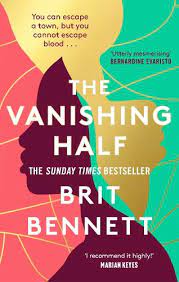Book review: The Vanishing Half by Brit Bennett

The Vanishing Half by Brit Bennett enjoyed a lot of success and hype when it was first published. I’ve had it on my to-read list ever since, yet I had somehow managed to avoid not only spoilers but any idea of the book’s setting or themes. I quite enjoyed coming to this novel completely fresh, though I doubt it would have marred my pleasure to know more.
In August 1954, identical twin teenage girls Stella and Desiree disappear from the small town of Mallard, Louisiana. In 1968 one sister returns. The story starts from Desiree’s return in 1968, expanding both back and forward from that point to fill in their childhood, the missing years and the future. It is thus a decades-long story but told as a mystery rather than a saga.
Though the core of the story is blood relatives who have split apart to lead very different lives, this novel concentrates more on chosen family. The twins’ mother Adele, widowed young, loves Early – a man who comes and goes from her home and her life, but always come back and is in his own way a loving stepfather to the girls. They never marry and, despite the time and location, this is accepted. Later, her granddaughter chooses a relationship with another man whose only real flaw is that they cannot get married.
Arguably, the source of the twins’ split is the troubled relationship that Mallard has to being a black town. A form of colourism exists in which the residents strive for lighter skin with each generation. This skews Stella and Desiree’s view of their own blackness – with opposite results. When Desiree returns to Mallard in 1968, it is with a daughter in tow – a very dark-skinned daughter, far darker than any other Mallard resident. Meanwhile, Desiree has discovered that she can pass, and has broken all links to her former life for fear that anyone in her new life discover that she is not as white as they are.
“In New Orleans, Stella split in two. She didn’t notice it at first because she’d been two people her whole life: she was herself and she was Desiree. The twins, beautiful and rare, were never called the girls, only the twins, as if it were a formal title. She’d always thought of herself as part of this pair, but in New Orleans she splintered into a new woman altogether.”
The concept of passing shows, possibly more than anything else, how race is a social construct and not truly about skin colour. And though passing does open up opportunities to Stella, she struggles to realise her ambitions – partly through fear of discovery, partly because she is still a woman. It is really only in the next generation that life gets bigger, options wider – and that is true for both twins’ children.
A detail about this novel that I was not expecting and that I thought was a very thoughtful inclusion: one of the secondary characters, Reese, is a trans man. His introduction is beautifully simple:
“On the road from El Dorado, Therese Anne Carter became Reese. He cut his hair off in Plano, hacking off inches in a truck stop bathroom with a stolen hunting knife. Outside of Abilene, he bought a blue madras shirt and a leather belt…In Socorro, he began wrapping his chest in a white bandage, and by Las Cruces he’d learned to walk again, legs wide, shoulders square. He told himself that it was safer to hitchhike this way, but the truth was that he’d always been Reese. By Tucson, it was Therese who felt like a costume. How real was a person if you could shed her in a thousand miles?”
The fact Reese is trans is rarely commented on, for the most part he is just a man interacting with events. But it does invite parallels with passing. Both Reese and Stella live with a fear of discovery, which could lead to rejection or horrible violence. However, there is a clear difference in that what Reese is living is the truth – he is a man – whereas Stella doesn’t really see herself as white, so she is arguably living a lie.
I like that Bennett doesn’t pass judgement on Stella for passing, only for having cut ties with her family. Which was probably necessary to pass – a surprising number of characters hire private detectives to track people. Was that a thing? Is it still a thing?
Above all, this is a really enjoyable read. With the pacing of a thriller, I whipped through it. But unlike most thrillers, it is populated with characters that feel real, in all their flaws and complexity. It covers enough time to reach a satisfying conclusion but not so much that it has to keep skipping to a new generation. I am very curious now to read Bennett’s first book, The Mothers.
Published 2020 by Dialogue Books.
One Comments
Comments are closed.